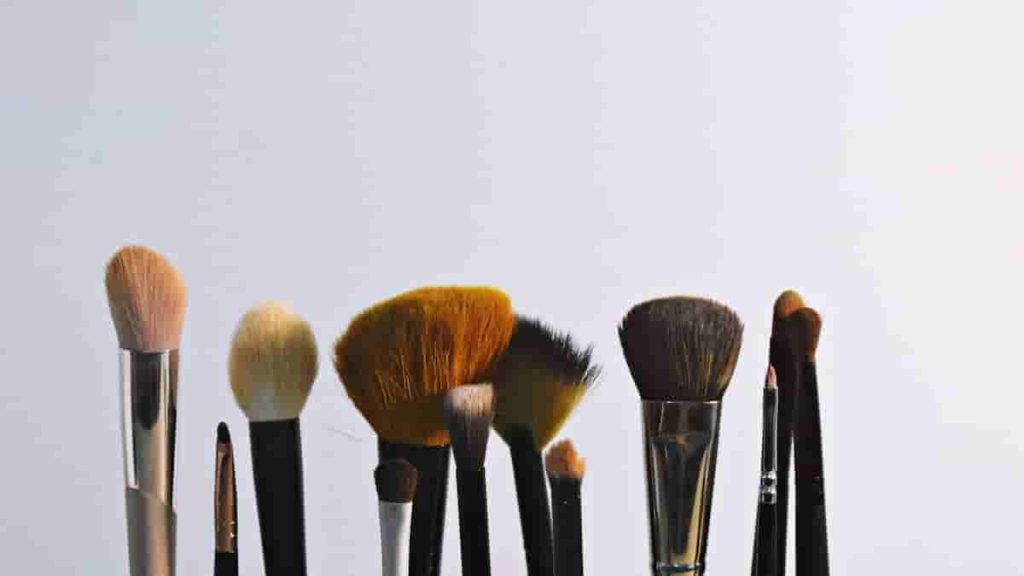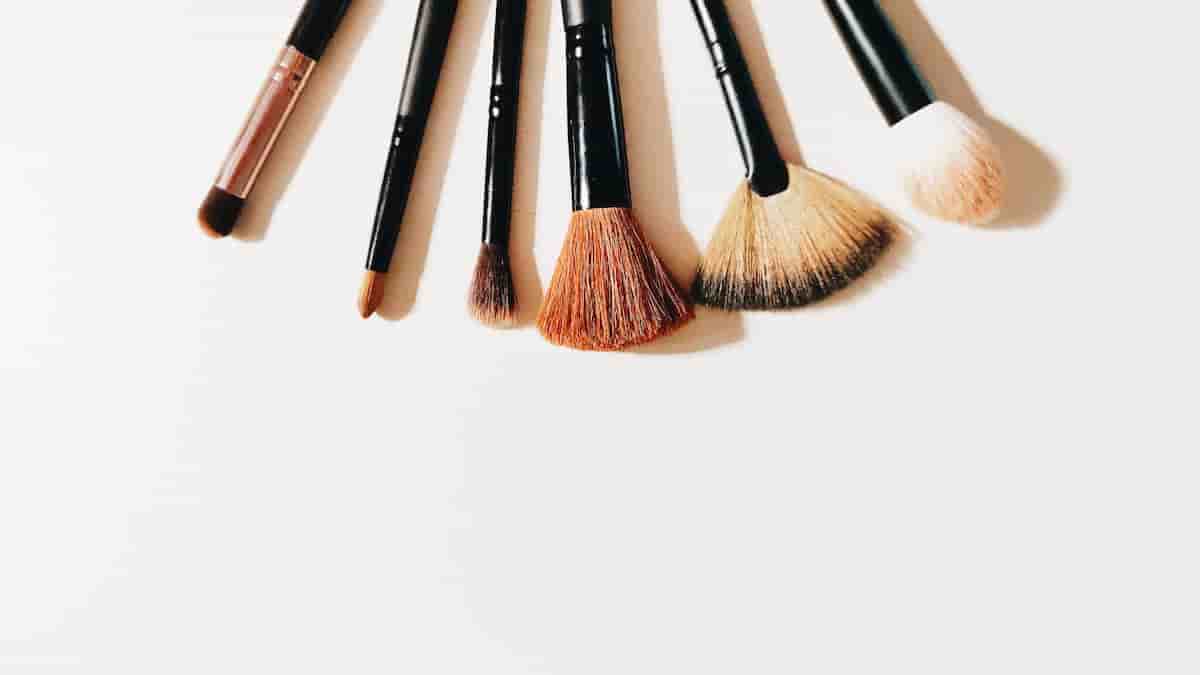Here is your complete guide to can dirty makeup brushes cause acne.
Introduction to Can Dirty Makeup Brushes Cause Acne
As we dive into the intricate world of skincare, one often overlooked culprit of skin issues is the cleanliness of our makeup brushes. The link between dirty brushes and acne is more significant than many realize. A recent study emphasized that neglecting these tools can lead to an array of skin concerns, with acne being a prominent issue. So can dirty makeup brushes cause acne?
Understanding Acne and Its Causes
- Acne isn’t a singular problem; it comes in various forms such as whiteheads, blackheads, pustules, and cysts.
- The causes of acne are multifaceted, including factors like hormonal changes, genetics, and lifestyle choices.
Makeup Brushes and Bacterial Build-up
- Makeup brushes act as a haven for bacteria, trapping oils, dead skin cells, and residual makeup.
- Studies have shown that unwashed brushes can harbor bacteria and germs at alarming levels, significantly increasing the risk of skin issues.
Bacterial Growth in Dirty Brushes
| Time Since Last Clean | Bacterial Count (per cm²) |
|---|---|
| 1 week | 500,000 |
| 2 weeks | 1,200,000 |
| 1 month | 5,000,000 |
Connection Between Dirty Brushes and Acne
- Research strongly indicates a correlation between unclean brushes and acne breakouts.
- Pores become clogged due to bacterial build-up, triggering inflammatory responses leading to acne.
Types of Acne Caused by Dirty Brushes
| Type of Acne | Description |
|---|---|
| Whiteheads | Closed comedones filled with trapped debris |
| Blackheads | Open comedones oxidized and turning black |
| Pustules | Inflamed, pus-filled pimples |
| Cysts | Deep, painful, often leaving scars |
Importance of Cleaning Makeup Brushes
- Proper cleaning of brushes is imperative to prevent bacterial build-up.
- Regular cleaning routines and suitable cleansing products can maintain brush hygiene.
Recommended Cleaning Frequency
| Type of Brush | Cleaning Frequency |
|---|---|
| Foundation | Weekly |
| Eye Shadow | Bi-weekly |
| Blush | Bi-weekly |
| Concealer | Weekly |
| Lip Brushes | After every use |
How to Avoid Acne Caused by Dirty Makeup Brushes
Step 1: Regular Cleaning Routine

Choosing the Right Cleanser
Use a gentle, antibacterial cleanser suitable for makeup brushes. Avoid harsh soaps that can damage bristles.
Weekly Cleaning
Aim to clean brushes at least once a week, especially those used with liquid or cream products.
Step-by-Step Weekly Cleaning Guide
| Steps | Details |
|---|---|
| 1. Wet brushes | Use lukewarm water to dampen the bristles. |
| 2. Apply cleanser | Use a small amount of gentle brush cleanser or soap. |
| 3. Gently lather and rinse | Work cleanser into bristles, then rinse thoroughly. |
| 4. Shape and dry | Reshape bristles and let brushes air-dry completely. |
Step 2: Dedicated Brush Storage
Proper Storage
Store brushes in a clean, dry area to prevent bacterial growth. Avoid enclosed spaces that can trap moisture.
Step 3: Avoid Sharing Brushes
Personal Use Only
Sharing brushes can transfer bacteria between users, leading to skin issues. Use brushes exclusively for personal use.
Step 4: Replace When Necessary
Monitor Brush Condition
Replace brushes if they shed excessively or show signs of damage. Old or worn brushes can harbor more bacteria.
Stay Mindful During Makeup Application
Clean Hands
Wash hands thoroughly before using makeup brushes to minimize transferring oils and dirt.
Following these steps diligently ensures clean, bacteria-free brushes, significantly reducing the risk of acne caused by dirty makeup tools.
Other Causes of Dirty Makeup Brushes and Solutions
| Causes | Solutions |
|---|---|
| Residue Build-up | – Use proper brush cleansers for thorough residue removal.<br>- Rinse brushes meticulously to eliminate product build-up. |
| Improper Storage | – Invest in brush holders or cases to shield brushes from dust and contamination.<br>- Ensure brushes are stored in a clean, dry area to prevent bacterial growth. |
| Infrequent Cleaning | – Establish a regular cleaning schedule, adhering to recommended frequencies for different brush types.<br>- Consider gentle, effective cleaning products for regular maintenance. |
| Shared Usage | – Avoid sharing brushes to prevent cross-contamination.<br>- If sharing is necessary, regularly sanitize brushes between uses. |
| Lack of Drying Time | – Allow brushes to air-dry completely before storage to prevent moisture accumulation and bacterial growth.<br>- Ensure brushes are thoroughly dry before reusing them. |
Preventive Measures for Cleaner Brushes
Regular Cleaning Routine
Develop a consistent schedule for cleaning brushes to prevent residue build-up.
Proper Storage
Store brushes in clean, dry areas, ideally in containers or holders designed for brushes.
Individual Use Only
Use brushes exclusively for personal use to minimize cross-contamination.
Thorough Drying
Ensure brushes are completely dry before storing to prevent bacterial growth.
Hygiene Awareness
Educate yourself and others on proper makeup brush hygiene to maintain cleanliness.
FAQs about Can Dirty Makeup Brushes Cause Acne
How often should I clean my makeup brushes?
Ideally, once a week for most brushes.
What happens if I don’t clean my makeup brushes regularly?
Accumulated bacteria and debris can lead to skin irritation, breakouts, and infections.
What happens if you don’t wash makeup brushes?
When makeup brushes aren’t regularly cleaned, they accumulate residual makeup, oils, dead skin cells, and bacteria. This build-up becomes a breeding ground for germs, leading to skin irritation, breakouts, infections, and can exacerbate existing skin conditions like acne.
Can you get acne from sharing makeup brushes?
Yes, sharing makeup brushes can transfer bacteria, oils, and skin cells from one person to another. This can potentially lead to breakouts, acne flare-ups, and other skin issues due to the introduction of foreign bacteria to your skin.
What is the reaction to dirty makeup brushes?
Dirty makeup brushes can trigger various reactions on the skin. Bacterial build-up can clog pores, leading to inflammation, redness, acne, and in some cases, infections. Some individuals may experience heightened sensitivity, itchiness, or allergic reactions due to the accumulated residue on the brushes.
Read Also: Castor Oil for Makeup Removal.
Is it OK to leave makeup brushes out?
Ideally, it’s best not to leave makeup brushes exposed to dust and airborne particles. Storing brushes in a clean, dry area, such as a makeup organizer or a brush holder, helps prevent contamination and bacterial growth. It’s important to let brushes air-dry properly after cleaning before storing them away.
Read Also: Foundation Free Sun Cream.
How much bacteria do makeup brushes have?
Studies have shown that unwashed makeup brushes can harbor millions of bacteria per square inch. The longer brushes go without cleaning, the higher the bacterial count becomes. Regular cleaning is essential to minimize bacterial build-up and maintain brush hygiene.
Read Also: Gold Sparkle Lip Gloss.
What kills bacteria on makeup brushes?
Using an antibacterial brush cleanser or a mild soap effectively kills bacteria on makeup brushes. Additionally, thoroughly rinsing brushes with lukewarm water and allowing them to air-dry completely helps eliminate bacteria. Regular cleaning and proper drying are key to keeping brushes bacteria-free.
Read Also:Purple Sparkle Lipstick.
Can dirty makeup sponges cause acne?
Yes, similarly, unclean sponges can harbor bacteria leading to acne.
Read Also: Glazen Eye Gloss.
Preventive Measures and Skincare Tips
- Alongside cleaning brushes, adopting a skincare routine can aid in preventing acne.
- Hydrating the skin, removing makeup before bed, and using non-comedogenic products are beneficial practices.
Read Also: Candy Made with Stevia.
Conclusion
In the pursuit of flawless skin, ensuring the cleanliness of our makeup tools holds significant importance. Neglecting to clean brushes can invite bacterial invasions, subsequently leading to dreaded acne breakouts. Prioritizing a routine to keep these tools pristine is a small yet crucial step towards healthier, clearer skin.
Read Also: Dreams about Eyelashes Falling Out.

